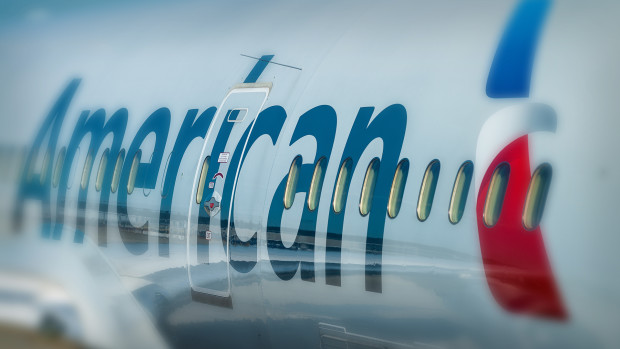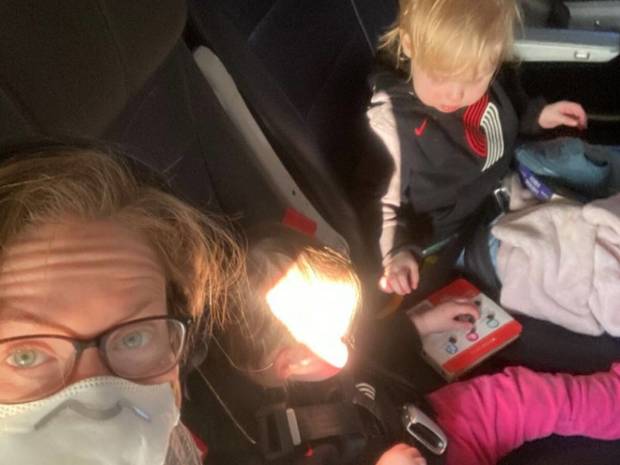
A mother traveling with her twin 18-month-old daughters on a Feb. 4 American Airlines (AAL) -) flight became engaged in a conflict with a flight attendant.
The dispute appears headed for court over a few key issues, including what legally constitutes "emotional distress."
DON'T MISS: Major U.S. airline makes strict change affecting all its passengers
Erika Hamilton, 36, and her daughters were traveling from Portland, Ore. to Tallahassee, Fla. The flight included a layover in Dallas.
In a phone interview with TheStreet, Hamilton explained that, due to the difficulty of being a single mother traveling with children, she had checked the infants' car seats in before the flight.
Because American Airlines' policy allows for infants to travel on a parents' lap and in a seat, provided the infant can sit up straight, she was ticketed for one on her lap and one on the seat next to her.
The first leg of the trip went fine, with no incidents, Hamilton said.
In Dallas, however, before takeoff, a flight attendant contradicted the airline's policy, telling Hamilton that American Airlines did not allow for one of the 18-month-olds to sit in the second seat Hamilton had purchased without a car seat.
Hamilton disputed this, but when she became convinced the flight attendant was about to throw the family off the plane, a ("wonderful," she said) passenger behind her offered to carry the infant on her lap.
After some discussion, this was allowed by the flight attendant and the flight proceeded to Florida, although an "unpleasant discussion" between Hamilton and the flight attendant continued while the flight was in the air, Hamilton said.
After the flight, Hamilton said she hoped to put the incident behind her. She called American Airlines about getting a refund, and maybe a voucher for the seat that wasn't used, for a future flight.
But the airline denied her the refund.
The passenger decides to sue
At that point, Hamilton, a lawyer from Portland, Ore. decided to take American Airlines to small claims court to recover $3,500 in damages.
"I personally think it's really important to hold corporations accountable when they try to cheat people out of their money," Hamilton told TheStreet. "I think corporations have become so used to doing that."
"And that was basically a breach of contract," she said. "If they had just refunded me and given me a voucher, we could have all gone our separate ways and it would be fine."
In addition to a refund, Hamilton's suit also included a claim for "emotional distress," according to legal documents obtained by TheStreet.
In terms of the emotional distress that I suffered, it was severe. The entire flight was excruciating. It was extremely stressful knowing that my daughter was not in my care but was in the hands of a stranger and that I realistically had no control over that. It was extremely distressing to not have either of my daughters secured in a safety harness during takeoff. It was embarrassing and humiliating to listen to the flight attendant (mistakenly) tell me that I was violating their rules and to have her continue this for most of the flight. The stress of the incident persisted through when I returned home to Oregon.
To be frank, I continue to have anxiety about flying with my children, especially when we are ticketed with American Airlines, for fear that I will be singled out in a similar manner — specifically given that through this litigation, rather than admitting to the basic facts, American Airlines has continued to insist that it is their opinion that I am an unfit parent.
American Airlines, in a legal document supporting its Motion for Summary Judgment, explained its view that Hamilton was not entitled to such a claim.
"Plaintiff’s intention to rely on emotional distress damages to support her breach of contract claim is contrary to Oregon law, and the formula she ... offers to calculate her damages does not support such," the document stated. "Therefore, Plaintiff cannot meet the damages element of her claim, and the claim should be dismissed."
Hamilton disputed the assertion that her claim was contrary to Oregon law.

Erika Hamilton
American says it can remove passengers 'for any reason'
Hamilton said, at the time, that she feared she was about to be removed from the flight.
In the legal documents, American Airlines asserted that it can deny a traveler's right to fly "for any reason."
"Under the terms of the contract, American was free to not let Plaintiff and her infants fly '(temporarily or permanently)' for any reason," according to one of the documents.
"American’s flight attendant did not need to make an assessment that the infant was not able to comply with the safety requirements in order to prevent the infant from flying, so whether she did or not is not material as it won't affect the outcome of the substantive elements necessary for Plaintiff’s breach of contract claim," the document said.
"The infant flew, and American was entitled to not allow her to for any reason," the document further asserted.
"I can't believe this is the hill they want to die on," Hamilton told TheStreet.
At the time of publication, American Airlines had not responded to two requests for comments on the matter.
Get exclusive access to portfolio managers and their proven investing strategies with Real Money Pro. Get started now.







